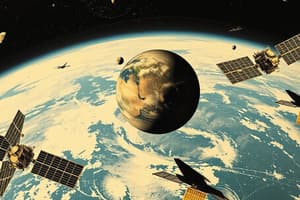Podcast
Questions and Answers
Earth is a satellite because it orbits the ______.
Earth is a satellite because it orbits the ______.
sun
The moon is a natural satellite because it orbits ______.
The moon is a natural satellite because it orbits ______.
Earth
Many satellites carry ______ to gather information about Earth and space.
Many satellites carry ______ to gather information about Earth and space.
cameras
Satellites send TV signals and phone calls upward to a ______.
Satellites send TV signals and phone calls upward to a ______.
Most satellites travel into space on ______.
Most satellites travel into space on ______.
A geostationary satellite moves in the same direction that the Earth is spinning and at the same ______.
A geostationary satellite moves in the same direction that the Earth is spinning and at the same ______.
Polar-orbiting satellites travel north to south, from pole to ______.
Polar-orbiting satellites travel north to south, from pole to ______.
Crashes between satellites are rare because orbits are designed to ______ other satellites.
Crashes between satellites are rare because orbits are designed to ______ other satellites.
Scientists use satellites to study Earth and ______.
Scientists use satellites to study Earth and ______.
Satellites that face toward space may watch for dangerous rays coming from the ______.
Satellites that face toward space may watch for dangerous rays coming from the ______.
Flashcards are hidden until you start studying
Study Notes
Definition and Types of Satellites
- A satellite is an object that orbits a planet or star; examples include moons and artificial machines.
- Earth and the moon are natural satellites, with Earth orbiting the sun and the moon orbiting Earth.
- Thousands of man-made satellites exist, providing various functions such as imagery and communications.
Importance of Satellites
- Satellites offer a unique bird's-eye view, enabling data collection over large areas and enhancing observations of celestial bodies.
- They surpass ground-based instruments by avoiding atmospheric obstacles like clouds and dust.
- Pre-satellite communication faced limitations; signals traveled in straight lines, restricted by terrain, complicating long-distance phone and TV transmissions.
- Satellites facilitate global communication by relaying signals to and from different locations on Earth.
Components of Satellites
- Common satellite parts include antennas for transmitting/receiving data and power sources such as solar panels and batteries.
- Many satellites are equipped with cameras and sensors, which can either focus on Earth or outer space for scientific analysis.
Orbital Mechanics
- Satellites are launched via rockets and must maintain balance between speed and gravitational pull to orbit effectively.
- Different satellite orbits exist, including geostationary (stays above the same Earth spot) and polar (travels from pole to pole, covering the planet).
Collision Risks
- Satellites can collide, but major space agencies monitor their positions to prevent crashes.
- Most orbits are specifically designed to avoid overlap, though increasing launches elevate collision risks, exemplified by the 2009 accidental crash between an American and a Russian satellite.
Current Utilization of Satellites
- Satellites aid in environmental monitoring, assessing clouds, oceans, land, and gases in the atmosphere, supporting weather predictions and climate science.
- They help track natural disasters and health issues, guiding responses to emergencies.
- Space-focused satellites examine solar phenomena, stellar history, and planetary details, such as searching for water on Mars or capturing images of Saturn’s rings.
Studying That Suits You
Use AI to generate personalized quizzes and flashcards to suit your learning preferences.




